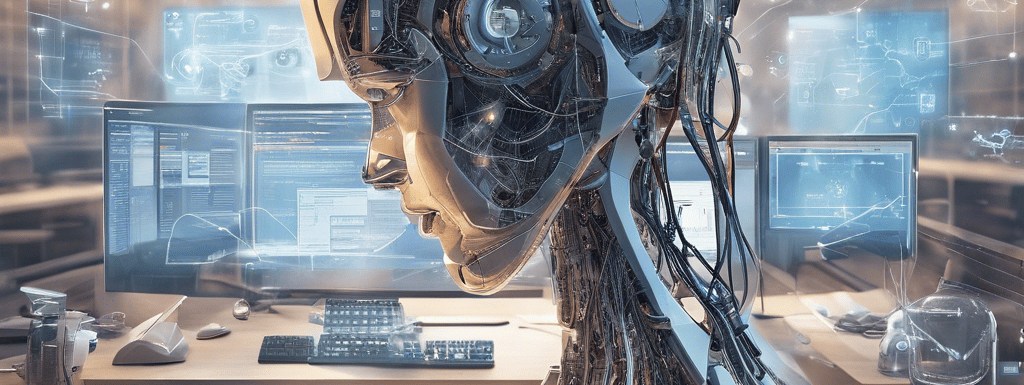AI and Automation: The New Frontier in Software Project Management Excellence
In the rapidly evolving landscape of software development, the integration of Artificial Intelligence (AI) and automation technologies is revolutionizing how we approach project management.
Praful Pujar
11/10/20243 min read
AI and Automation: The New Frontier in Software Project Management Excellence
In the rapidly evolving landscape of software development, the integration of Artificial Intelligence (AI) and automation technologies is revolutionizing how we approach project management. As a veteran practitioner who has witnessed the transformation of project management methodologies over decades, I can attest that we're not merely experiencing an incremental improvement—we're at the cusp of a paradigm shift that will redefine project delivery excellence.
The Evolution of Project Management Intelligence
Traditional project management relied heavily on human intuition, experience, and manual data analysis. While these elements remain valuable, the introduction of AI and automation has elevated our capabilities to unprecedented levels. Modern project management platforms now serve as cognitive engines, processing vast amounts of data to deliver actionable insights in real-time.
Introducing GenAI-Integrated Solutions
With the advent of integration of Generative AI on top of traditional project management tool, project leaders can now access deeper insights into their projects. This tool not only enhances data analysis but also empowers leaders to perform what-if analyses, enabling them to explore various scenarios and make informed, data-driven decisions. By leveraging advanced AI algorithms, our platform provides predictive analytics that can significantly improve project outcomes.
Data Orchestration and Quality Assurance
The foundation of this transformation lies in sophisticated data management systems that seamlessly integrate data from tools such as Jira or any other project management tool, HRMS, Financial systems. These integrations enable:
Automated data collection across multiple project touchpoints
Real-time validation and cleansing of project metrics
Intelligent classification of information into relevant performance indicators
Continuous monitoring of data quality and completeness
Advanced Analytics and Performance Metrics
The true power of AI in project management becomes evident in how it processes and interprets data:
1. Predictive Analytics
- Learning models analyze historical project data
- Pattern recognition for early risk identification
- Accurate resource requirement forecasting
- Sprint velocity optimization recommendations
2. Automated Performance Tracking
- Real-time Earned Value Management (EVM) calculations
- Automated Cost Performance Index (CPI) tracking
- Schedule Performance Index (SPI) monitoring
- Variance analysis with root cause identification
Quantifiable Benefits and ROI
Organizations implementing AI-driven project management solutions are reporting significant improvements:
Metric Improvement
Project Variance : 40% reduction
Risk Detection : 60% improvement
Reporting Overhead : 85% reduction
Resource Utilization : 30% increase
Decision-Making Speed : 70% faster
Practical Applications in Modern Project Environments
1. Resource Optimization
Advanced AI algorithms now optimize resource allocation by:
- Analyzing team member skills and availability
- Predicting resource requirements based on project complexity
- Suggesting optimal team compositions for specific project types
- Identifying potential resource conflicts before they impact delivery
2. Risk Management
Modern risk management has evolved into a proactive discipline through:
- Continuous monitoring of project health indicators
- Automated identification of potential bottlenecks
- Early warning systems for scope creep
- Predictive analysis of external factor impacts
3. Stakeholder Communication
AI-powered systems enhance stakeholder engagement through:
- Automated generation of stakeholder-specific reports
- Real-time project dashboards with predictive indicators
- Intelligent summarization of project status
- Automated alerts for critical developments
- Given the technology for Stakeholders to perform "What-if" analysis on project progress
Implementation Strategies for Success
To effectively leverage AI and automation in project management:
1. Start with Clear Objectives
- Define specific areas for automation
- Establish measurable success criteria
- Align AI implementation with organizational goals
2. Focus on Data Quality
- Establish robust data collection processes
- Implement data validation frameworks
- Ensure consistent data taxonomies
3. Enable Gradual Adoption
- Begin with pilot projects
- Scale successful implementations
- Continuously measure and adjust
Looking Ahead: The Future of Project Management
As AI and automation technologies continue to evolve, we can expect:
- Enhanced predictive capabilities through deep learning
- More sophisticated natural language processing for project documentation
- Advanced visualization techniques for complex project data
- Increased automation of routine project management tasks
Conclusion
The integration of AI and automation in project management isn't just about technological advancement—it's about transforming how we deliver value through software projects. By embracing these technologies, organizations can significantly improve their project delivery capabilities while reducing overhead and increasing accuracy.
However, it's crucial to remember that AI and automation are tools to augment human judgement, not replace it. The most successful implementations will be those that strike the right balance between technological capabilities and human expertise.
What transformative impacts have you observed from AI/automation integration in your project management practice?
About Author
Praful Pujar is a seasoned IT leader who has played the role of AVP / Head of Delivery in various organizations. With extensive experience in the IT industry, Praful has first hand knowledge of the challenges faced by startups and growing companies. His expertise in project management and delivery has been honed through years of navigating the complexities of scaling IT operations while maintaining efficiency and quality.
Praful's journey has given him unique insights into the struggles of balancing growth with effective project governance. This experience drove him to develop innovative solutions like the IT Program Governance dashboard, aimed at empowering smaller companies to compete with larger enterprises through data-driven decision-making


